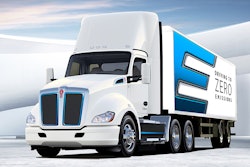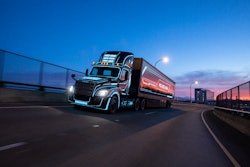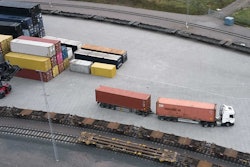As you read this, government and industry leaders from around the world are meeting in Scotland for COP26 to negotiate commitments to decarbonize their respective greenhouse gas emissions. Here in the United States, with the recent Washington drama over the bipartisan Infrastructure Investment and Jobs Act and the Build Back Better Act, there’s been a lot of talk about the cost of climate action. What is enough? Is there such thing as too much?
For example, although the most recent $1.75 trillion version of the Build Back Better Framework is a far cry from the original $3.5 trillion proposal, it still includes $555 billion in climate and clean energy spending, making it the largest climate investment in American history. But what does climate action have to do with the trucking industry? It turns out a lot.
The trucking industry is responsible for moving nearly 12 billion tons of goods, valued at over $10 trillion, across our nation’s highways each year. As the saying goes, “If you got it, a truck brought it.” That goes for groceries, medications, and yes, all those Amazon packages.
It’s no surprise that infrastructure is vital to the trucking industry. In fact, as American Trucking Association’s (ATA’s) president and CEO, Chris Spear, highlights in his recent blog post, the trucking industry’s business model “centers on interstate commerce and the safe and efficient movement of freight over the road.”
Worryingly, Spear explained, as the nation’s infrastructure system breaks down, “real, measurable, and rising costs borne directly by motor carriers” increase. Spear gives the example of the three-month closure this past summer of the I-40 Hernando de Soto Bridge, which cost the trucking industry an estimated $200 million.
These sorts of events that shut down infrastructure critical to the safe and efficient movement of freight are more likely in the “new normal” of a climate-changed world, particularly when we understand that much of our nation’s infrastructure is already in the advanced stages of decline. For example, 43% of our country’s 4 million miles of public roadway are in poor or mediocre condition. And more than 46,000 bridges across the United States are structurally deficient. To make matters worse, even the infrastructure deemed adequate was engineered and built to withstand the climate conditions of the time. However, as we have witnessed, climate change has “loaded the dice,” causing “500-year” events like floods to become an every decade or even every year occurrence.
As the climate crisis results in more intense and more frequent natural disasters, these events compound. For example, in my home state of Colorado a particularly horrible wildfire season in 2020 resulted in a significant loss of soil-stabilizing vegetation throughout Glenwood Canyon. This past summer, when a particularly strong rainstorm inundated the area, a mudslide swept through the canyon, destroying the road and closing I-70 in both directions for nearly two weeks. This one mudslide was a huge hit to the trucking industry, costing fleets that rely on this vital corridor extra miles and fuel for alternate routes, lost time, additional truck maintenance and even driver turnover.
There is no question that our nation’s infrastructure needs an upgrade and that failing to invest in the necessary improvements will result in added costs for carriers, which will in turn be passed on to shippers and end consumers. However, it is not just roads and bridges that require investment. We must also invest in the vehicles that utilize our infrastructure in order to modernize and reduce harmful emissions from them.
As the climate crisis worsens and calls to reduce emissions grow louder and more urgent, industries that have historically relied on fossil fuels to power their operations are grappling with an existential crisis. Policymakers, consumers and even investors are demanding that companies mitigate their climate risk by making plans and taking action to reduce climate change-causing greenhouse gas emissions.
The trucking industry is not immune. In fact, the sector is responsible for approximately 7% of all greenhouse gas emissions in the United States. Luckily, we have solutions for decarbonizing trucking — namely, zero-emissions vehicles like electric trucks that increasingly run on renewable energy. Not only is this technology better for the climate, but it is also appreciated by drivers, more efficient than internal combustion vehicles and healthier for communities that have historically been subject to diesel pollution. So, when Daimler Trucks Head of eMobility Rakesh Aneja said at ACT Expo earlier this year that “inaction is not an option,” I tend to agree.
Sure, currently available electric trucks may come with some sticker shock, but they are already starting to achieve parity with diesel trucks from a total-cost-of-ownership perspective. And their price tag pales in comparison to the cost of inaction.
So where to start? I recommend learning from those who are doing (like those fleets and OEMs who participated in Run on Less – Electric or the Electric Fleet Readiness Group), getting involved with coalitions working to advance zero-emissions solutions (like the Mission Possible Partnership and the Global Commercial Vehicle Drive to Zero project), and yes, even jumping into the messy middle. Oh, and the $127 million the federal government just committed to help the industry develop solutions won’t hurt either.
As a senior associate with RMI’s Carbon-Free Mobility team, Jessie is dedicated to accelerating the clean energy transition and specializes in emissions reductions from heavy-duty transport. She works closely with the North American Council for Freight Efficiency (NACFE) to advance electric truck adoption, and her background also includes work on transit bus electrification, charging infrastructure buildout, policy, stakeholder engagement and facilitation, and project management. Prior to joining RMI, Jessie served as the Sustainability Program Coordinator for the City and County of Denver. Jessie is the Co-Lead of the Colorado Front Range Chapter of Women of EVs (WEV), a board member of Drive Clean Colorado, and a member of Women in Trucking (WIT).










